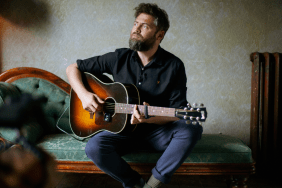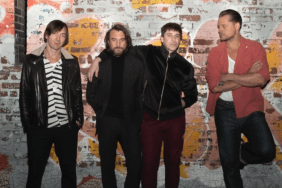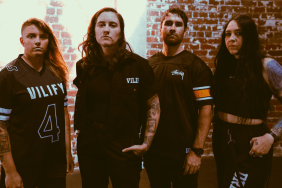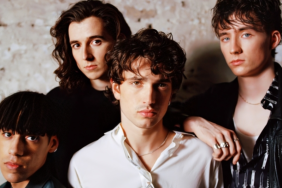Let’s face it; ever since Elvis stepped out on stage with his hair coiffed back and a swing in his hips, image and music have been inseparable. One could even argue that artists like Mozart and Beethoven, with their larger than life personas, made use of the same type of cult of personality that so drives today’s music industry. Book Of Ships main man D A Calf, however, is not one to buy into that approach too heavily though.
Preferring to allow his music to spring forth from his imagination without editing and sculpting, even avoiding writing along a similar theme or idea, his band’s debut album Dark Continent, Cold Century is nevertheless very much based in the pop/rock spectrum, even if not being confined to it. Produced by Scott Horscroft, the album has been well received by fans and critics alike, the band embarking on a short tour to promote its release, landing at Mum at World Bar this Friday the 12th of November.
We took this chance to have a chat with Calf, discussing not only the album and how he approaches writing, recording and performing but also his views on the music industry and related issues such as illegal downloading.
Music Feeds: So you guys have just finished your debut, Dark Continent, Cold Century; tell me about the album. Would you say it has set themes?
D A Calf: The album’s tracks have a theme that perhaps underpins them, but this was not a conscious decision prior to writing the songs, rather it was something which emerged and which I realised much later on. Essentially the themes revolve around thoughts of having neglected things and people, of loss, and of hope in the face of it, of questioning whether you have chosen the right option. These themes can be seen as metaphors for thoughts that the enlightenment has failed and that we live in an age that is bunkum. Twentieth century political history is a great illustration of this and hence the album’s artwork.
MF: How does it feel to have it done and out there? You seem to be getting a pretty warm reception from the critics; has that translated over to your live shows and sales as well?
DAC: It feels really good to have gotten this album out. It was quite a process and we’re quite looking forward to moving on to making the next one now. We’ve really only just started to play the record live. Things are steadily growing but we have no idea about sales to date.
MF: You just played The Workers Club on the 6th; how did that go?
DAC: The Workers was a really good show; probably our best to date. If every room we played could be like that, we’d be very happy.
MF: There were a few guests on the album; was it a case of having to work on the album before you put the band together?
DAC: This album had a weird gestation. There was a band before the record began and a band now that the record’s done, but the making of the record was pretty much a solo venture. Some of the guests on the record were members of the first line-up; some are just good friends who I wanted to have a hand in the making of it.
MF: You worked on the album with Scott Horscroft; what was that like and how did it come about? Was it a just case that you saved up the money and booked him or did he sort of seek you out?
DAC: It was certainly a case of the former. I had assisted on a couple of sessions at BJB and had friends who had recorded with him. BJB seemed to be the right place to track some stuff and mix the record and Scott seemed to have the right feel for the job. I learnt a lot from working alongside Scott.
MF: The album fits under the vague umbrella of indie rock, in lack of a better term, which, let’s face it, is a pretty crowded genre. How do you try and stand out from the crowd, or is that not a consideration for you when making the music?
DAC: I think I just try to write things that appeal to me and that I think will be respected by people I respect. If the material doesn’t end up standing out then it probably didn’t deserve to in the first place.
That said, it seems to be that the most valuable person a band can enlist nowadays is a publicist in order to get your schick to cut through. When I spend too much time thinking about those types of things, I start feeling like getting out of it all.
MF: As an upcoming musician, what do you think about downloading and music piracy? I just did a quick search and couldn’t find the album anywhere for download, so it’s obviously not a concern for you just yet, but does that at all affect your perspective on making music for a living?
DAC: I certainly don’t believe in the construction of any laws to counter copyright discretions, but I certainly think individuals should consider the ethics of illegal downloading of music – and on a case-by-case basis at that.
Are the big labels corrupt and worth destroying? Quite possibly so! Does that mean their artists deserve to be stolen from? Because let’s remember when the labels feel the pinch they pass it on to their artists.
And what about the smaller artists? Is it right that someone profits from the fruits of another’s legitimate labour without adequate compensation?
And what about ‘from each according to their abilities to each according to their needs’?
An ethic such as this would mean that the person on the minimum wage whose life would be profoundly enriched by the acquisition of the new U2 record should feel no qualms about acquiring it for free when the artist can bear such a loss of income.
At the other end of the spectrum, the struggling artist would be paid for their record. This helps them recoup their costs and afford to make the next record.
Personally, I think of this record as a retailer would a loss leader. I want as many people to hear the record as possible through whatever means, but I’d also like to be able to recoup some of its costs and to know where the money for the next record will come from.
MF: Your music has a distinctly international sound; would you say that’s intentional? Are you inspired by any Australian bands?
DAC: It wasn’t intended to have either an overtly Australian or international sound. Sounds are sounds and I don’t feel too parochial about Australian artists nor do I necessarily feel the need to project my own geographical place in my writing. My two favourite Australian artists at the moment are The Drones (who have a very Australian sound) and PVT (who have a very continental European sound), both of whom I am definitely influenced by.
MF: How does the live show compare to the album? Is it a case of note for note recreation or do you try to offer a different perspective on the songs in a live forum?
DAC: We try to be true to the songs and play to their strengths live. When making the record there was no concern to limit it to what could be reproduced live. I’d much rather make the best record I can and then work out how to represent it live. Live and recorded versions can be two different and equally valid interpretations of the one song. There are some tracks on the record though that we don’t play live because we think they are a bit too demanding/indulgent.
MF: I’ve noticed you are playing one show on the tour as a solo artist. How does playing with the band compare to getting up there by yourself? I can imagine playing solo you feel more out there and exposed with nothing but the songs to entertain the audience, which must feel pretty rewarding.
DAC: I actually find playing with the band more rewarding and playing solo more daunting. Playing solo is good in that you can be a bit more loose with interpretations, arrangements and alcohol consumption, but I still miss the other parts of the songs. It’s a lonely gig too.
MF: What do you have planned for after the tour?
DAC: After this tour we’re going to get writing the next album and work on some extra aspects of the live show, including visuals. Then we do another little run mid-January to give the album a belated launch before bunkering down for most of 2011. That’s the plan at least.
Book Of Ships play Mum @ Worldbar this Friday November 12th












